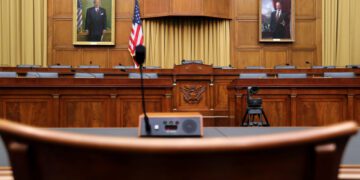By John F. Di Leo -
As you may have heard, Illinois has a pension problem.
Now, that’s not Illinois’ only problem, of course. Illinois also has a crime problem, an education problem, a quality-of-life problem, a transportation problem, a public corruption problem, an unemployment problem, and a population shrinkage problem. Frankly, there isn’t enough room in this column to list all of Illinois’ problem, but that’s a start.
The Chicago Fed – that’s the Chicago branch of the Federal Reserve System – has proposed an idea for dealing with a part of Illinois’ pension problem. Since the problem is that many state and local government pension funds were criminally-underfunded for decades (on purpose, since Illinois politicians believe you can always just raise taxes later), the Chicago Fed has proposed a trial balloon: a thirty-year special assessment of an additional 1% of home values. Only for thirty years or so.
Don’t worry that this proposal would only address the five pension funds administered by the state. The other 650 or so government pensions across Illinois, and all of Illinois’ many other problems, would remain unaddressed by this proposal… but at least those five state pension funds would finally be made whole. In thirty years. They hope.
There are several flaws in this proposal, not least being the sheer size of it. In a state that already has the highest property taxes in the country, the idea of astronomically increasing them yet again is clearly nonsensical at its core. Picture a typical Illinois home worth $300,000, receiving a $9000 annual property tax bill. This homeowner is already paying 3% in property taxes (though in some areas the average is four, five, or more percent already). Yet another one percent would add another $3000 to the homeowner’s bill each year… for thirty years, the duration of a typical starter homeowner’s 30-year mortgage obligation. The proposal is designed to stick with Illinois taxpayers throughout their entire working life (Illinoisans learned long ago that there’s no such thing as a temporary tax in the Land of Lincoln).
Besides it being politically untenable – the cost is too high – and outrageously limited in benefit – even such a high tax would only address a portion of our pension problem – it has a third critical flaw: it is based on a zero sum theory, the assumption that all the numbers from last year can be used to predict the future forever.
Hardly unusual among proposals from the adherents of Keynes and Engels, the zero sum approach to economics has been a fundamental flaw in most policy failures of at least the past century. The proposal’s alleged benefits are built on a foundation of sand, because the pension obligation of today will only grow, but the population of Illinois taxpayers in years to come will only shrink.
Already Illinois has been a net loser of residents for decades; this annual deficit has been growing in recent years. More of those arriving are poor immigrants (both legal and illegal), while more of those fleeing are working taxpayers.
In the final analysis, how does public policy work? You draw those whom you encourage; you drive off those whom you discourage. It’s not rocket science. But the effect matters, not just on the discussion at hand, but on every discussion in the political landscape. We are driving away the taxpayers we need, through ever-higher taxes. And when higher taxes are your problem, higher taxes cannot simultaneously be a solution.
What Do Taxes Do?
Those who advocate tax increases, of any kind, always sell them on how they intend to spend the revenue collected. They neglect to admit that government coffers are almost always a general fund in fact, so the money collected actually goes to a thousand other things that have nothing to do with the honorable cause identified for the tax’s passage. Did the income tax make Illinois solvent, as promised? Did the lottery fund Illinois education, as promised? Did the tollbooths go away once the expressways were built, as promised? Have any promises ever made by an Illinois politician ever been kept?
It might therefore be more instructive to consider what damage taxes do. What do taxes do to the individual, to the employer, to the charity, to the infrastructure? What do taxes do to a community, despite the sweeping promises of rainbows and unicorns promised by the advocates of any tax ever discussed?
Income Taxes: Perhaps the easiest to describe, this is the one we see most clearly. If you earn a salary, you look at your paycheck and you see a nice, big number on the top, and a much lower number on the bottom. If you own a business, the second you turn a profit, even after years of struggle, you must commence those quarterly payments. The government doesn’t share in your loss, but it’s always there to share in your gain. Why? Because the state and federal governments have to take “their” cut. You worked forty hours (or more) that week, how much did the government work? No matter. They take it, just the same.
Social Security and Medicare Taxes (formerly known as FICA): This is a particularly offensive burden for small businessmen and younger workers. While the early generations to participate in Social Security tended to benefit from it, this New Deal era scheme would make Ponzi blush if he saw it today. The government takes some 15% of our income (that’s counting both the half we see on our check and the mandatory matching half that our employers make for us… unless we’re small businessmen so we get to watch both halves fly away). And what do we get for it? A retirement payment a fraction of what it would have been if we’d been free to invest it ourselves, and an old age healthcare plan only barely better than indigent care in many areas.
More strikingly, particularly when we view these two burdens together, we see another painful impact: They combine to discourage entrepreneurship. America was built on individuals striking out on their own, starting proprietorships, agencies, stores, manufacturing plants. If a new business makes it, the proprietor isn’t the only one who benefits; he hires employees, brings on partners, employs builders and maintenance staff, pays rent and utilities and property tax, as a productive member of the community. Discourage that entrepreneur from starting up in the first place, and the loss isn’t just his tax contribution, but all those other people too. It’s the unseen casualties of taxation that are the most crippling for a state or country.
Sales Taxes: Illinois taxes almost everything you buy at the point of purchase. With a state base level, and a county tax on top of that, then a local tax from one’s city or village, and of course the tiny levy of the township, we have the most taxing districts of any state in the union, and that’s shown in product prices. Cook County’s sales tax is among the nation’s highest, actually hitting the double digits (and occasionally going over, whenever the Cook County Board of Confiscators feels their oats). This raises the cost of nearly everything, so people buy less than they would otherwise. You only have so much to spend; if the state decrees that a higher proportion of that dollar must go to the state, then a lower proportion is naturally left for the store. Is it any wonder that retail is dying in Illinois, and in every other state with high property taxes?
Property Taxes: Finally we come to the taxes on our homes, apartments, office buildings and stores. The government must pay for its schools, police, firemen, and park districts, of course; the lion’s share of such burdens – particularly the schools – falls on the property tax. Here again Illinois is the highest in the nation, by most means of measurement. Illinois’ average –pushing 3% of home value – tops any other state… it even tops New York, New Jersey, and California. But more importantly, in some ways, it’s half again as high as our neighbor Wisconsin’s average… two and a half times Kentucky’s average… fully triple our neighbor Indiana’s average.
What does this mean to the homeowner? It lowers the value of one’s property, since it’s obviously harder to sell a property that comes with such a crippling burden. And it lowers the quality of home or business that a person can afford, because again, just as with sales taxes, the owner only has so much to spend on housing; if the state chooses to mandate that a higher proportion goes to taxes, then the homeowner has less to spend on the place itself. Wanted a four bedroom with three baths for your family and your in-laws? Thanks to taxes, you may need to make do with a two or three bedroom, and just one bath. Counting on paying off the mortgage by retirement so that housing would be a minimal cost in your old age? A $10,000-plus annual property tax bill kills that wise-retirement plan dead.
In general, what do high taxes do?
- Taxes reduce the money available to a shopper for shopping – hurting the store and its employees, to the advantage only of the government.
- Taxes reduce the quality of one’s home, erode one’s retirement plans, make the home difficult to sell when a great job offer arises somewhere else.
- Taxes dissuade taxpayers from moving into a state; while the indigent won’t care, those who would pay these taxes will comparison-shop before moving in. Hence our current ongoing resettlement deficit. If you have job offers in Wisconsin, Indiana, Kentucky or Texas, you don’t willingly move into Chicago.
- Taxes dissuade employers from establishing new businesses, or expanding existing ones. Taxes drive off those already here. Consider the global company with plants both in Illinois and in reasonable places like Indiana and Texas. It may keep its headquarters in Illinois, but plant expansions will occur in other states or even other countries. Once you’re encouraged to move away, there’s nothing to stop you from moving as far as you can.
But perhaps most important of all is the fact that each tax reduces the pool of funds available for everything else.
Taxes bring a halt to the creation engine of a free economy. When one shopper has ten percent less to spend, only that shopper feels it. But when every shopper has ten percent less to spend, the whole mall suffers.
When one homeowner sees his property tax eclipse his mortgage payment, he and his family suffer a lower standard of living, and fewer options for their future. But when that happens to an entire state, it drives employers and employees alike to take heel and run away, ever-deepening the annual gulf between receipts and obligations.
For too long, the politicians of Illinois have focused on what they hope that taxes will do for us… too rarely do they focus on what taxes do to us.
We never hear anything about cost-reduction, about trimming back our expectations of government. We only hear of hands in our pockets… and in our neighbors’ pockets… and the pockets of our children, and our parents, and our employers.
To most Illinois politicians, the solution is never found in their own resources, diligence, or courage.
To most Illinois politicians, the solution is always shining brightly, tucked just inside your wallet and mine.
And for a century now, that’s been as far as they have been able to see.
Copyright 2018 John F. Di Leo
John F. Di Leo is a Chicagoland based trade compliance trainer, writer and actor. Permission is hereby granted to forward freely, provided it is uncut and the IR URL and byline are included.







